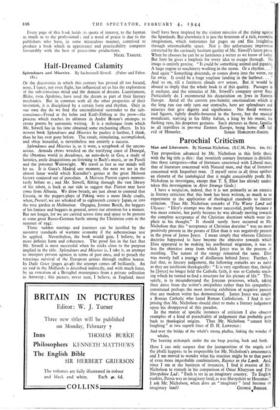Half-Dreamed Calamity
Splendours and Miseries. By Sacheverell Sitwell. (Faber and Faber. 1:88.)
OF the discoveries in which this century has proved all too fecund, none I fancy, not even flight, has influenced art as has the exploration of the sub-conscious mind and thE domain of dreams. Lautreamont, Blake, even Apuleius, have used the dream as part of their literary Mechanics. But in common with all the other properties of their invention, it is disciplined by a certain form and rhythm. .Only in • our own day do we find the unconditional surrender to the sub'conscious—Freud at the helm and Kraft-Ebbing at the prow—the process which reaches its ultimate in Andre Breton's attempts to create poems by automatic writing. It is a technique from which Mr. Sitwell has in his time obtained some enchanting effects. In his 'newest book Splendours and Miseries he pushes it further, I think, Than he has ever gone before. The result, stimulating, accomplished, and often beautiful, is nevertheless not entirely a success. SplenJours and Miseries is, as it were, a scrapbook of the unconscious. Armada crews wrecked on the terrifying coast of Donegal, the Ottoman world in decadence, an auto-da-fe in Goa, a study of lunatics, jostle disquisitions on listening to Bach's music, or on Fuseli and the poisoner Wainwright. We travel as fast as our minds will let us. It is Goya's Madrid one moment, the next we are in the almost lunar world which Kaendler's genius at the great Meissen factory conjured out of porcelain. A Meissen Pierrot capers momentarily before us ; and Mr. Sitwell, flitting through the vast library of his talent, is bade at our side to suggest that Pierrot may have come from Albania. We draw breath, are just about to contend that Etruria, or the puppet-plays of Peking were a more likely cradle, when, Presto!, we are whisked Off to eighteenth century Japan, or into the rose garden at Malmaison Orgagna, Jerome Bosch, the beggars of his fantasy and beggars in general, arrest our attention for a minute. But not longer, for we are carried across time and space to be present at some great Russo-German battle among the Ukrainian corn in the summer of 1942.
These sudden soarings and journeys can be justified by the austerest standards of wartime economy if the subconscious test be applied. Nevertheless, the book would gain, I believe, by a more definite form and coherence. The proof lies in the fact that Mr. Sitwell is most successful when he sticks close to the purpose implied in the title. Splendours and Miseries is, I take it, an attempt Co interpret present agonies in terms of past ones, and to preach the tenacious survival of the European genius through endless horror. In Dulle Griet (pages 42-46) the attempt comes off brilliantly. An air raid in the Midlands is described indirectly, and with much force, by an evocation of a Breughel masterpiece from a private collection in Antwerp ; this picture, never seen, I believe, in England, must itself have been inspired by the violent miseries of the rising against the Spaniards. But elsewhere it is just the boxroom of a rich, recondite imagination, which . Sometimes for pages on end flits freightless through unremarkable space. Nor is this unfortunate impression corrected by the curiously hesitant quality of Mr. Sitwell's latest prose. When he chooses he can be as luminous a writer as we know of today. But here he gives a loophole for every idea to escape through. No image is entirely precise. "It could be something animal and gigantic. A huge engine or machinery working in the storm. Or a rhythm...." And again "Something descends, or comes down into,the water, not far away. It could be a huge seaplane landing in the harbour. . .." And so on, till a furriness clouds our senses. But -it -would be absurd to imply that the whole book is of this quality. Passages in it enchant, and the stimulus of Mr. Sitwell's company never flags. Particularly do I recommend his disquisition on Jews in Eastern Europe. Amid all the current pro-Semitic emotionalism which in the long run can only turn our stomachs, here are splendours and miseries that .give dignity and significance. Not floriti westernised figures, tightly double-breasted in the Savoy, but. the musical mendicant, starving in his filthy kaftan, a king by his music, his flashing eyesrhis desperate gestures. Such pictures as these, familiar to all travellers in pre-war Eastern Europe, bring home thI full evil of Himmler. SIMON HARCOURT-SMITH.






















 Previous page
Previous page